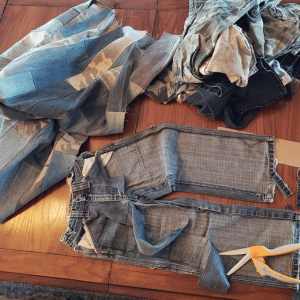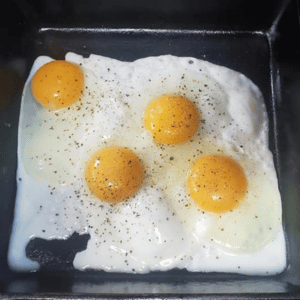Homestead Economics: Going To Market

A pile of bright red tomatoes, stacks of freshly baked bread, plates of scrumptious cookies, racks of quirky jewelry, tubes of lip balm, bouquets of colorful flowers, baskets of vibrant berries, swathes of homemade wares, and oodles of goodies; all while a collection of people mill about in an open space, conversing and delighting in their shopping adventure. A Farmer's Market has always held such a special place in my heart. Being a vendor was a top-tier secret goal that I have had ever since college, and it wasn't until the last couple of years that I was able to achieve it.
Where Do I Start?
Homesteading to me isn't just a hobby, it is a way of life that molds and shapes the future of my household and Community. It isn't uncommon to hear from other women how they feel the need to validate their passions financially; making profits on their endeavors. I often feel the same strain to make everything lucrative to be recognized by my peers and family as successful. The trouble with this is that when everything becomes about nickels and dimes, the value that it has for us can become strained. I certainly don't spend my time interrogating others on their hobbies and how profitable they are, but I digress.
There are many good reasons to seek out economic options on the homestead. Supplementing or replacing income, going off-grid, networking, improving options for barter/trade, building confidence, increasing public options for goods, and more. There are multiple reasons why I started my business The Misty Mushroom, but it was mainly about combining everything I do here on my small farm into a brand where I could do many things that I enjoyed while avoiding any burnout; having options to shift with the market of demand.
What Do You Want To Sell?
Researching your market is one of the biggest steps towards success. If the market is supersaturated with an item, even producing higher quality can be tough on sales. We have to examine the cost of production, advertisement, time investment, supplies/materials, seasonal expectations, laws, insurance, issues, and our own gratification with it overall. Homestead economics can be anything from a bread business to large-scale crop production, but your market and addressing the questions associated with it are crucial. Look into the vendors that frequent your local markets and see what is missing, what works, or what appeals to you.
Of course, there are a lot of questions to ask when starting out or when seeking to revamp your endeavors so far. It can become increasingly overwhelming to many, and even the thought of selling produce at a Farmer's Market can suddenly involve a lot more than bargained for. I will detail a bit of my journey and the information that I've gleaned along the way, and I welcome commentary on your own experiences in the homestead business at the end.
The Basics
Almost all farmer's markets or vending opportunities require the following:
- Business License
- Vendor's License
- Insurance
- Fee for Vending
- Application to join
It is difficult for a small business to often make such investments, but look into the pricing for licensing within your state from the government website, and speak to your insurance agent on options. Keep in mind, once you obtain a vendor's license, you will be required to file taxes at the end of the year even if your sales are zero. Also, don't fall for websites that charge less for an LLC business license (they are often out-of-state law offices that take ownership of any court-related issues that may arise with your business. You want your own choice in a lawyer, so pay to file with your state).
Some markets are extremely stringent on rules while others aren't. Fitting in with cottage laws will be a determining factor also. Vending opportunities can range in price from a low $10 a day to a lofty $100+ per day. There are many local events that I have looked into that are just ridiculously outside of my budget, and often sadly end up attracting transient vendors that sell mass-marketed wares from out of the country for a huge profit margin.
I always want to at least make back the money at each market to afford my presence. If I drive an hour and make back only what the market costs to vend at, then I am not in a great position to return. A lot of my artist friends shell out for vending at conventions only to count their dollars later and realize they didn't make enough to even cover the hotel expenses.
Another aspect to consider is the equipment required to vend. The basic vending setup is folding tables, a canopy, and a vehicle to transport your wares and setup. One farmer I enjoyed chatting up was hugely successful selling produce from the back of his truck with no frills attached, while a gal who did commissioned artwork of people's homes had a remarkable homemade trailer that folded out into her display space. Some markets provide tables, but all have a designated space size for each vendor to utilize; usually 10ft by 10ft.
Common Questions

When and where is the unloading and setup for the event?
Most markets provide an hour, but larger events may have more time available for setup. Some involve a short hike while most allow vendors to park directly at their location and unload, but then demand for vehicles to be immediately moved to allow others space for unloading. Some markets have detailed explanations and maps of vendor locations, while others are extremely vague or on a first-come-first-serve basis. Expect that often things change the day of the event, as some vendors cancel and tweaking of the layout is done. Speaking to many market organizers has revealed that some vendors are not easy to work with in these regards. Being kind, flexible, and professional are all reasons that vendors get asked back.
How long is the event, & your personal needs?
Vending is exhausting, and unless you have extra hands to help; staying fed, hydrated, or using the bathroom can be difficult. Pack plenty of drinks and snacks, and scope out the distance for the facilities if they hopefully have them. I've had to abandon my post to take an extended hike, and it is certainly not the desired outcome. Bring a chair to sit in, sunscreen, a hat, a hand fan, and anything else you require for the time.
Handling money?
Cash is king at events, so make sure you have plenty of small bills to break down the plentiful $20 bills that fill your pockets. I have my banking app on my phone to accept checks, PayPal for electronic, and Square Reader for credit cards. There are many options, and don't be afraid to use a calculator to stay on track. Often it can get hectic while talking to multiple customers and handling a transaction at the same time. I use a locked cash box to store bills and use an apron for easy exchanges of cash. Before each event, I count my till and inventory my products, then count again after the event. Each is logged for my records.
What is your plan?
Practice at home setting up your canopy and tables, with an idea of how you want your products displayed. Various layouts of tables exist, some are open formats to allow more patrons into your tent while others are very space-limited for 1-2 people at a time. Keep in mind how your setup looks to customers walking by and how to pull in more, making sure to have prices visible and large.
Vendors like myself have a lot of product and a lot that goes into the display, which takes time to set up. Many things can be done beforehand or that organize your flow better. Consider simplifying your setup or adding easy decorative touches that don't require much to do, such as bundles of dried herbs or a vase of flowers. It certainly is intimidating for me when I see the amount some businesses have done for their display; including a customized canopy, signage, and other aspects that weren't cheap. It seems to assist in their overall attractiveness to patrons, but let's not forget the down-to-earth farmer with broccoli in a cardboard box and selling out every market.
Going Further
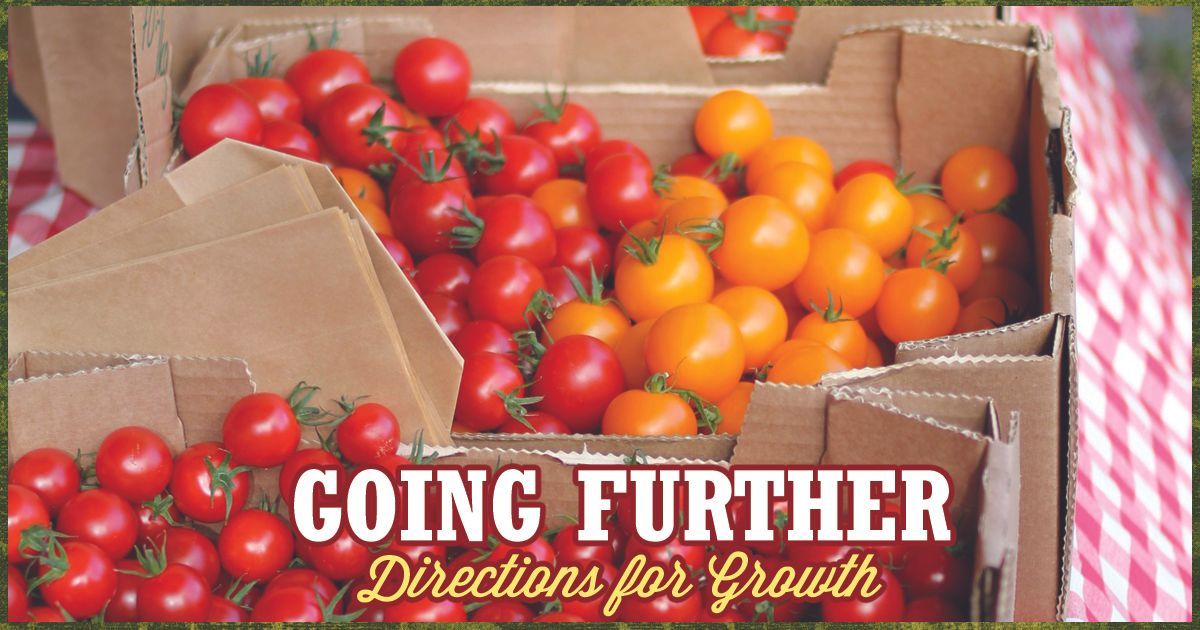
The Almighty Dollar
Money is both my greatest friend and enemy. I am always looking for methods that utilize sufficiency in one way or another. I get brown shopping bags from friends and stamp them with my logo even if they already have another company's logo on them. Plant tags are created from cut-up milk jugs, and even using some old plastic food containers to house plants. A lot of money can be spent on making a professional presentation at a farmer's market but I have never had a customer turn up their nose to one of my recycling methods; it can become a selling point. I even offer customers a 10% discount if they return my plant containers.
Growing slow and expanding annually with better methods and equipment is important to me. A few friends have invested great funds into a craft only to find the market unfavorable or not enjoyable long term. Many homestead avenues that require quite an initial investment if you are starting from scratch. Contact your local Extension office to discuss any grant opportunities available for your farming endeavors, and also research available state grants for small businesses. Begin with grants and then lean into loans if necessary. Just the money to invest in a plant tag printer is far outside of my budget at this point.
How To Push Your Product?
Networking and Word-of-Mouth are extremely important to promote yourself if your business involves direct consumer sales. Online reviews can frequently make or break a business—I try to push friends and family who have tried my products to leave reviews. I also take the advice of my father who is a Funeral Director and strict professional by omitting any political or debatable social issues from my business page or political signs on site. You can disagree with me on that, as many express their support for various causes, but I like to keep things neutral despite the fact that I have many passionate viewpoints. Certain things like conservation and environment directly correlate with my native plant sales, but I don't believe separating my consumer base on other issues is advisable because, at the end of the day, my goals in public awareness and education are higher on the pedestal.
I am big on bridging the gap with the public, especially because my product is against the grain of common methodology. I often have to work three times harder to push a product like native plants vs those that sell cultivated flowers. Other entrepreneurial endeavors do not involve such a harsh market, but there will always be challenges. Doing the overall research and talking to various vendors or producers will give you great insight into the future. A well-known Midwest native plant grower told me she was penalized for years by the greenhouse inspector because there were examples like Monarch butterfly caterpillars on her milkweed plants; which to their standards was a pest on a consumer product. Completely ridiculous!
Where Is Your Market?
Is your market local, international, online, or other? I know many who ship viable hatching eggs of rare poultry breeds on eBay for much more than they do in their own state. Many farms have online pages to promote and advertise their livestock, while others use social media to push their products and personal brands. If your comfort level doesn't include building your own website or navigating social media, then outsourcing the work will be necessary with some occupations and layers of success. My business page on Facebook is finally monetized to make money, but even taking the time to create original content may only gain me twenty bucks a month. Don't be discouraged, and understand that many homestead content creators out there who make it big now employ video editors and other folk to push their brand/channel.
Social media can be highly beneficial for free advertisement when you visit various markets and events. Your posts can be shared in local groups and city pages to push them toward a new audience. A local entertainment business I work for tested the theory of advertisement and found that just social media investment for ads far surpassed attendance numbers than previous methods. I try to dive into my local economy as much as possible and constantly find new businesses I had no idea existed. Farmer's markets are a great opportunity to see these entrepreneurs in action. If you have no intention of running a small business from your homestead, consider pushing and sharing your local people who are working hard to promote themselves online. Take the time to leave favorable reviews, those tidbits of value go a long way.
As we begin the Farmer's Market season, get out and network if you don't already; it is the season to grow together as a Community!

